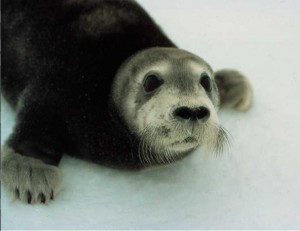
Anchorage– Alaska industry, Alaska Native groups, and state and local governments scored a significant win Friday when U.S. District Judge Ralph Beistline ruled that the National Marine Fisheries Service (NMFS) listing of the U.S. Arctic population of bearded seals under the Endangered Species Act (ESA) was “inherently arbitrary and capricious.” The court ordered the listing action by NMFS immediately vacated.
In a consolidated lawsuit led by the Alaska Oil and Gas Association (AOGA) and the American Petroleum Institute, a coalition of the oil and gas industry, Alaska Native groups, Alaska governments, argued that NMFS’s decision to list the Beringia subpopulation of bearded seals as a species threatened with extinction was unprecedented and unlawful.
Plaintiffs contended that the listing decision was based on speculation about what could happen in a century as a result of global climate change, if the species responds in a manner that has not been observed, and if the theoretical future impact on the species is of a magnitude that is scientifically impossible to determine.
Judge Beistline agreed. “After reviewing the voluminous record and the applicable caselaw, the Court has determined that the action of NMFS listing the Beringia [subpopulation] of bearded seals was ‘arbitrary, capricious, an abuse of discretion, or otherwise not in accordance with law.’”
Judge Beistline emphasized that “the lack of any articulated discernable, quantified threat of extinction within the reasonably foreseeable future” was a critical failing of NMFS’s listing decision. The court also held the agency’s listing decision was procedurally defective in failing to comply with a statutory duty to adequately consider and respond to comments submitted by the State of Alaska.
“This decision is a win for science,” said Kara Moriarty, AOGA President and CEO. “Throughout this process, AOGA has maintained that no scientific evidence exists to link climate change now or in the future to adverse effects on these species. AOGA’s opinion is that these listings were not supported by the available scientific data, which show bearded seal populations to be healthy, abundant, and thriving. We are gratified that Judge Beistline agreed.”
